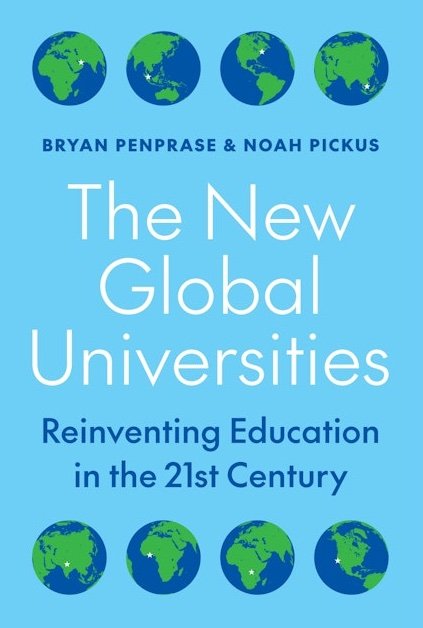
UNIVERSIDAD 2025
Duke Kunshan University
An interview with Noah Pickus
Dean for Academic Strategy and Learning Innovation
The New Global Universities: Reinventing Education in the 21st Century
Noah Pickus, the co-author of “The New Global Universities: Reinventing Education in the 21st Century” is Associate Provost at Duke University, with responsibilities in academic strategy, global initiatives, and educational innovation. A faculty member at Duke for over 25 years, he also serves as Dean for Academic Strategy and Learning Innovation at Duke Kunshan University, where he previously led curriculum design and faculty hiring. Pickus has also served as Chief Academic Officer for the Minerva Project and as Director of Duke’s Kenan Institute for Ethics, bringing a wealth of experience in innovative education and ethical leadership to his work. He is also the Founding Director of the Institute for Emerging Issues at North Carolina State University and co-directed the Arizona State University-Georgetown University Academy for Innovation in Higher Education Leadership Intensive Program, a training ground for entrepreneurial academic leaders.
In a conversation held with Alvaro Sanmartin Cid, Founder of Minds Studio, Pickus shares some highlights of his book and sheds light on the transformation of global universities. Together, they explore the evolving landscape of higher education, delving into stories of institutional innovation, global collaborations, and the challenges of adapting education to the demands of the 21st century.
A Lifelong Entrepreneurial Journey
Reflecting on his career, Pickus characterizes himself as a “serial entrepreneur inside universities.” With a foundation in public policy and a PhD centered on immigration and citizenship, his trajectory includes pioneering initiatives at NC State University and Duke University, launching think tanks, and directing ethics and education programs. His role at the Institute for Emerging Issues, for example, focused on how universities can shape the future of their states.
“Most of us live our lives forward, but they only make sense when we look at them in retrospect,” he notes. His career later extended globally, involving joint ventures such as Duke Kunshan University in China and his role as Chief Academic Officer at the Minerva Project. These experiences culminated in a journey of innovation, where he explored new educational paradigms, blending his expertise with global collaborations.
Inspiration Behind the Book
Pickus’s book, written with Byran Penprase, astrophysicist and Vice President for Sponsored Research and External Academic Relations at Soka University of America, arose from a shared curiosity. Together, they sought to counterbalance the prevalent criticisms of higher education in the United States with the burgeoning optimism found in universities worldwide. “There’s so much hand-wringing in the U.S. about education,” remarks Mr. Pickus, “but globally, the sun is shining.”
Dr. Pickus and Dr. Penprase documented eight global universities, uncovering inspiring stories of their creation and identifying critical lessons for innovation.
The book profiles 8 new universities and colleges, including African Leadership University, Minerva University, Yale-NUS College (Singapore), Ashesi University (Ghana), NYU Abu Dhabi, Olin College of Engineering, Fulbright University Vietnam, and Ashoka University (India). These institutions, Pickus explains, “show how infinitely harder it is to start a university than a company.” By sharing these narratives, the authors hoped to inspire both reform and creativity in higher education.

The eight universities featured in the book were chosen based on four key criteria:
Commitment to Liberal Arts and Sciences
These institutions focus on integrated knowledge, emphasizing interdisciplinary and holistic education.
Global Orientation
The universities represent a worldwide perspective, moving beyond the often U.S.-centric discussions of higher education.
Compelling Storie
Each institution’s origin and mission provide a unique and valuable narrative.
Publisher Constraints
While the authors wanted to include more examples, their publisher advised limiting the scope to eight case studies.
The Duke Kunshan University Story
Duke Kunshan University (DKU), a joint venture between Duke University and Wuhan University, exemplifies a bold experiment in global education. Situated near Shanghai, it offers a liberal arts undergraduate program and master’s degrees in areas like global health and environmental science. DKU emphasizes cross-disciplinary majors, reflecting the real-world organization of knowledge around problems rather than disciplines.
“The more global the university, the more you need to insist on a core knowledge base,” Pickus emphasizes. DKU’s curriculum incorporates immersive learning, shorter terms for deeper focus, and an emphasis on teaching quality. These features aim to prepare students for global challenges, fostering leaders who are adept at navigating complex, interdisciplinary issues.
Building an Open-Source Model for Education
A key theme in Pickus’s work is the idea of an open-source model for higher education. Drawing parallels to open-source technology, he advocates for a system where the “source code” of education—curricula, methodologies, and institutional practices—is shared and iterated upon globally. This model contrasts with the colonial or competitive approaches often seen in higher education.
“When we built DKU, we didn’t say, ‘Here’s the Duke curriculum. Where would you like it?’” Pickus explains. Instead, the university combined insights from Duke, Chinese institutions, and global best practices to create something unique and adaptable.
This approach fosters mutual learning and continuous improvement, creating a dynamic “ecology” of innovation rather than a static, one-directional system.
The Challenge of Scale and Quality
In addressing the growing global demand for higher education, Pickus highlights the tension between scalability and quality. While technology enables institutions to scale, he cautions against prioritizing quantity over meaningful education. “You can have large schools reaching many students with very poor education,” he warns.
The solution, he suggests, lies in a pluralist model of education—one that encourages diverse institutions to experiment and learn from one another. For instance:
Ashoka University
offers high-quality education in India at a fraction of the cost of studying abroad.
TEC de Monterrey
explores innovative methods of course design and delivery, balancing quality and affordability, located in Mexico.
By fostering an ecosystem of experimentation and collaboration, global universities can address regional needs while advancing universal principles of education.
Building Communities of Practice
Pickus resonates with the idea of education as a means to connect individuals with shared aspirations—what Alvaro calls “intellectual villages.” However, he warns against creating silos that isolate disciplines or groups. Universities must instead facilitate cross-disciplinary and cross-cultural exchanges, enabling students to navigate diverse intellectual and social landscapes.
As an example, Pickus describes the open-source culture within universities. When building DKU, he visited institutions worldwide, many of which freely shared their curricula and insights. This spirit of collaboration, he believes, is essential for shaping the future of education.
Intimations of the Future
Looking ahead, Pickus identifies trends that point to the future of higher education:
Unbundled Yet Integrated Models
Institutions like Inteli in Brazil balance specialized training with holistic, problem-solving education.
Flexible Pacing and Modular Learning
Schools such as Universidad de la Libertad in Mexico offer customizable pathways for students, reducing costs while maintaining quality.
Global Alliances
Initiatives like the Global Alliance for Innovation and Access in Higher Education aim to connect emerging institutions with established ones, fostering capacity building and community development.
This pluralist approach reflects the dynamic needs of higher education—a balance between preserving institutional traditions and fostering innovation. Pickus envisions a world where both new and established universities collaborate to create ecosystems of mutual support and shared learning.
Four Examples of Excellence
To illustrate this vision, Pickus highlights four institutions excelling in specific areas:
Olin College of Engineering
Revolutionizing engineering education with experiential, hands-on learning and design-oriented curricula.
Ashoka University
Promoting a civilizational dialogue by blending ancient texts with modern debates in the Indian context.
African Leadership University
Instilling character and resilience with its motto, “Do hard things,” and fostering student-driven success.
Inteli in Brazil
Innovating pathways for data scientists to combine technical skills with broader social and ethical awareness.
Each institution exemplifies a unique aspect of education, from character building to interdisciplinary problem solving.
The Path Forward
As the demand for higher education grows, Pickus advocates for a balance between the “science” and “art” of teaching. Great educators, he asserts, blend pedagogical expertise with creativity, creating transformative learning experiences.
Through his work and insights, Noah Pickus offers a vision of higher education that is innovative, inclusive, and impactful. By embracing new models, fostering collaboration, and prioritizing quality, global universities can lead the way in addressing the challenges of the 21st century.

This article is available in Spanish via Nueva Revista. Click HERE
Universidad 2025 is a publication by:
Nueva Revista
Nueva Revista is a Spanish publication dedicated to analyzing contemporary society, focusing on culture, humanities, science, art, and politics. It offers in-depth analysis and expert perspectives on topics such as higher education innovation, technological advancements, social change, and public policy. Featuring contributions from renowned academics, writers, and thought leaders, the magazine fosters critical dialogue and intellectual debate, making it a key reference for those interested in the intersection of knowledge, society, and progress.
If you’d like to read this year’s edition of University 2025 in Spanish, please click below:

In collaboration with Proeduca
PROEDUCA’s objective is to provide the best online higher education to its students and it achieves this through educational commitments at three universities: The International University of La Rioja, the Online University of Mexico (UNIR Mexico), and CUNIMAD. It also offers studies located in Peru, at the Newman Postgraduate School, and in the United States, where it has a presence through MIU City University Miami.
